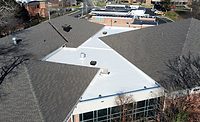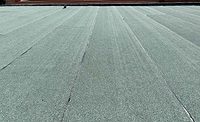Garland Introduces World's First Thermoset Polyurethane-Modified Membrane
CLEVELAND, OHIO --The Garland Company Inc. has developed the world's first and only thermoset polyurethane-modified membrane designed to retain its resiliency and get stronger over time.
The new OptiMax polyurethane-modified asphalt-based roof membrane uses innovative, patent-pending technology that combines asphalt and polyurethane to create the most durable and longest-lasting modified membrane on the market. Unlike traditional asphalt membranes, OptiMax becomes increasingly resilient as it ages because with time, polyurethane molecules are chemically linked with one another. The process was first used in Europe in the paving industry.
“OptiMax has the ability to literally change the face of the roofing industry," said Melissa Rus, Garland’s director of research and development. "This new technology will revolutionize the market and redefine expectations of building owners in terms of performance and protection."
When traditional SBS-modified membranes age, the oils within the membrane heat up and “cook out”, causing cracking and eventually leaking. OptiMax combines two highly effective waterproofing materials – polyurethane and asphalt. The “active modification” process involves chemically reacting the polyurethane modifier to specific molecules within the asphalt.
This modification provides enhanced long-term performance characteristics and weatherability. Its performance is further improved by the fact that minerals are more strongly attracted to the polyurethane in the OptiMax membrane. The result is improved adhesion thus providing superior UV protection, preventing the likelihood of cracking and leaking issues common in traditional membranes. During advanced surface testing, OptiMax had fewer cracks when compared to traditional asphalt-modified membranes and retained its tensile strength in the face of damaging UV radiation.
"OptiMax has been engineered to outperform other commercial roofing products in the industry,” Rus said.
Visit www.garlandco.com for more information.
Looking for a reprint of this article?
From high-res PDFs to custom plaques, order your copy today!






